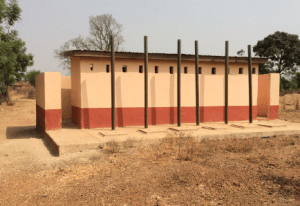Ten communities in Bongo benefit from ODF facilities

The Bongo District Assembly in the Upper East Region has handed over about 222 toilet facilities with building materials to 10 communities as part of efforts to end the menace of Open Defecation (ODF) in the district.
The facilities and building materials being provided with funding from the United Nations Children’s Emergency Fund (UNICEF) code named “Digniloo” and the initiative formed part of the numerous measures being implemented by the Assembly to end open defecation by the end of 2019.
In an interview with the Ghana News Agency in Bongo, Mr Peter Ayamga Ayinbisa, the Chief Executive Officer for Bongo disclosed that 40 artisans have been trained as part of the project to assist the various communities in the building of toilet facilities.
The DCE revealed that about 60 communities in the district have been declared open defecation free and a further 18 communities have been triggered to end the environmental phenomenon.
Mr Ayinbisa, who stated that the Assembly has also constructed 10-seater toilet facilities at Zorko and Bongo-Soe markets as part of measures to achieve OPF, explained that it was his believe that members of the various communities, especially those who have benefited from the UNICEF initiative would use the facilities purposefully to help end the menace in the communities by the close of 2019.
The DCE further revealed that the Assembly in collaboration with other development partners including the World Bank, WaterAaid Ghana and UNICEF, were determined to deal with the fluoride content in the water sources in the district and achieve the Sustainable Development Goals particularly goal six, which put emphasis on potable Water and good Sanitation.
Following this, he said, the Assembly, through the District Assembly Common Fund had constructed 38 boreholes across the district whilst the World Bank project, which was benefiting two selected fluoride districts including the Bongo and the Chereponi Districts in the North East Region was providing potable water to eight selected fluoride communities in the district.
He mentioned beneficiary communities as Lungu, Balungu, Namoo, Boko, Feo, Dua, Adaboya and Bong-Bogorogo and added that the Ministry of Special Initiative is providing solar powered mechanized boreholes to other fluoride communities including Amanga, Nayorigo, Gambrungu, Gowrie-Kunkua, Beo and Feo.
The DCE stated that plans are in place for the Ghana Water Company Limited to redirect the treated water from the Vea Dam to communities in the Bongo district and said these were efforts to help reduce the fluoride content in the district.
Mr Ayinbisa noted that UNICEF and WaterAid Ghana had provided potable water to schools and health centres in the district with all the Community-Based Health Planning and Services (CHPS) compounds in the district connected to World Health Organization standard waster systems.
The DCE commended the donors for their support and appealed to his constituents to support the policies of government to improve upon their lives.
Source: GNA
